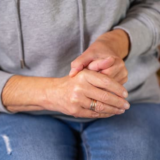Losing the COVID kilos
July 2, 2020 by Lisa Bywaters

An article in the news this week caught my eye and really struck a chord. I don’t know about you, but the period of isolation has seen me gain a little more weight than I’m happy with
Having more time to cook and create, stress eating, the return of Masterchef (Go Poh!) and not being as physically active as we were before COVID…not to mention the snacking, cocktail hour and a whole bunch of other factors has caused many of us to gain weight during iso.
Apart from the many health issues associated with being overweight (e.g. heart disease, diabetes, high blood pressure) it’s also linked to increased pain and joint damage due to the increased stress on your joints. It can also affect your ability to be as active as you’d like, which can lead to more pain, musculoskeletal issues and weight gain. We also know that fat releases molecules that increase inflammation throughout your body.
Clearly maintaining a healthy weight is important.
So if, like me, you want to lose some of the weight you’ve gained during the last few months, we can do it! We can turn this around. It may be a challenge and take some time, but we can lose the COVID kilos.
- Start with a goal. It really does help if you have a clear goal in mind. Just the idea of losing weight isn’t a goal, but a specific, measurable plan – for example – losing 5 kilos in 8 weeks is. So make sure your goal is SMART – specific, measureable, achievable, realistic and has a timeframe. Read our blog on setting goals for more info. When you’ve created a goal that suits your specific wants and needs, write it down and put it somewhere prominent. It’s a great visual to help you stay on track, and remind you of why you started.
- Keep track. It’s helpful when you’re trying to get back into a healthy routine to write down what you’re eating. You can use a simple notepad or download an app. Whatever format you choose, make sure you use it. Add every little thing you eat and drink, how much you’re consuming and when. Keeping track of your food intake really helps you see if your diet is balanced and it can help you spot any trends as far as snacking, serving sizes etc. That’ll help you adjust things if you need to.
- Eat a balanced diet that includes a colourful variety of foods, such as fruits, vegetables, whole grains, dairy products, proteins and healthy fats. This gives your body the energy and nutrients it needs to work properly, helps you maintain a healthy weight, helps protect you against other health conditions and is vital for a healthy immune system.
- (Re)Establish a routine. If you had a healthy diet and exercise routine pre-COVID, reestablish it. It may not be exactly the same, but if you had it once, you can do it again. Look at what’s changed for you over these last few months, how it’s affected your diet and exercise, and what things you need to do to get things working again for you in this new world. If you didn’t have a good routine before COVID, now’s the perfect time to get one. Think about your typical weekday (weekends will have a slightly different routine), what you need to fit into your day including your family, work and other commitments. Write it all down and think about how you can establish a routine that works for you. Think about when you’ll work on creating healthy meal plans, when you’ll shop for ingredients, when you’ll cook, and when you’ll exercise. If you break it down into the small tasks, it makes it easier to fit into your schedule. This may take some trial and error, but it’s worth the effort.
- Get the family involved. Whether you have family living with you, or they’re in another location, get them involved. They’ll be your cheer squad, but they may also benefit from a little TLC when it comes to their diet and exercise. You can support each other, work through problems together, share recipes and ideas.
- Exercise. Obviously. Make sure exercise is part of your everyday routine. It’s important to help manage your musculoskeletal condition, pain, mental health, weight, sleep – and so many others things.
- Get a good night’s sleep. Research has shown a clear link between not getting enough sleep and weight gain. Poor sleep is also linked to difficulties losing weight. As many people with musculoskeletal conditions struggle with sleep, this is yet another reason to really look at how you can improve your sleep quality and quantity. And if you need help, talk with your doctor.
- Eat mindfully. This involves taking the time to be aware of what you’re cooking and eating – savour the tastes, the smells, the textures. Be present while you eat, and try not to be distracted by things like the work, TV and other devices. Don’t hurry, eat small bites, take your time and enjoy.
- Distract yourself. Sometimes we eat not because we’re hungry, but because we’re bored, sad, lonely or upset. Before you eat something outside of meal times, ask yourself why you’re reaching for that food. Do you actually feel hungry? Or is there another reason? If you’re not hungry, distract yourself with a walk, call a friend, drink a glass of water (not wine! – many of us are overdoing that too – see below).
- Choose snacks wisely. I’m not a chocoholic, but somehow it’s been finding its way into my cupboard on a regular basis. It’s easy for this sort of thing to become a habit, so be mindful of what you’re snacking on and how often. If you’re snacking on less healthy options like high fat, high sugar or high salt treats, substitute them for healthy options such as fruit, vegetables, nuts, yoghurt. But be aware of the serving size and the frequency. You can have too much of a good thing! And save the treats for when you can really savour them. When you only eat them occasionally you’ll enjoy them even more.
- Acknowledge that you’re not perfect and you may eat some things that aren’t part of your healthy eating plan. That’s OK, you’ll get back on track. Don’t let it trip you up, or allow the negative self-talk to sabotage your weight loss. Go back to your goal, remind yourself why you’re doing this, and move on.
- Don’t deprive yourself but don’t ‘treat’ yourself too often either. Find that balance of enjoying your food, but don’t use it as a reward or to make yourself feel better if you’re feeling down or stressed.
- Get help. If you’re struggling with your weight and you need professional help, talk with your doctor or dietitian. They can help you with practical information and strategies that are specifically tailored to you.
- Be careful with alcohol. Reports are showing that many of us are drinking more during these stressful times. If that sounds familiar, cut back on your alcohol intake. Substitute other drinks that you enjoy instead of alcohol, though be careful of drinks high in sugar. Try different teas and infusions, add lemon and other fruits to your water, give kombucha a go (maybe? It can be an acquired taste), make a mocktail (again be careful of the sugar content).
Contact our free national Help Line
If you have questions about things like COVID-19, your musculoskeletal condition, treatment options, telehealth, managing your pain or accessing services be sure to call our nurses. They’re available weekdays between 9am-5pm on 1800 263 265; email (helpline@msk.org.au) or via Messenger.
More to explore
- Check out our recipes page
The recipes have been created by Melissa Jones, an Accredited Practising Dietitian. Melissa volunteers her expertise and knowledge to help us bring healthy and nutritious recipes to people with musculoskeletal conditions. - Tips the scales in your favour
Musculoskeletal Australia, 16 April 2020 - Why keep a food diary?
Harvard Health, 31 January 2019 - Weight management
Musculoskeletal Australia - Eat well for less
Musculoskeletal Australia, 24 January 2020 - Healthy Weight Guide
Australian Government Department of Health - The psychology of comfort food – why we look to carbs for solace
The Conversation, 15 April 2020 - Nutrition and healthy eating resources
Nutrition Australia - Weight management
Dietitians Association of Australia - Weight loss – a healthy approach
Better Health Channel
Photo by Heather Ford on Unsplash














